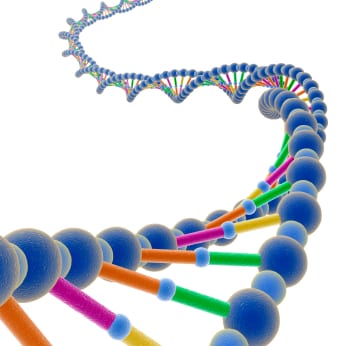
Cancer of the pancreas, which strikes more than 40,000 men and women in the United States each year, is an especially deadly malignancy. There is no effective screening test for the disease and it is usually not detected until it has spread throughout the body. The five-year survival rate is only about 5%.
Understanding more about the genetic factors that impact pancreatic cancer has the potential to improve prevention and early detection methods, and open new avenues for treatment. In 2009 one of the first genomewide association studies of pancreatic cancer showed that a SNP on chromosome 9 was associated with risk of the disease. This finding was not only one of the first strides into understanding the role of common variation in the disease, but it also added new evidence to the decades-long association between type O blood and lower risk for pancreatic cancer.
Now researchers from the same group have found variations in three other regions of the genome that also affect pancreatic cancer risk. The results, based on an analysis of 3,851 cases and 3,934 controls of mainly European ancestry, were published online this week in the journal Nature Genetics.
The first of the newly identified genomic regions, located on chromosome 13, has been shown by other researchers to be frequently deleted in a variety of cancers, including pancreatic cancer. There is also evidence that there might be a gene in this region that affects breast cancer susceptibility.
The second region the researchers linked to pancreatic cancer risk was on chromosome 1. All of the chromosome 1 variants identified by the researchers are located in and around a gene called NR5A2, which appears to be critical for embryonic development and has links to cell growth and division. All of these functions make it a strong candidate for a gene that is involved in cancer.
The final genomic region associated with pancreatic cancer in this new study is on chromosome 5. One SNP showed a significant association with the disease. It is near two genes, CLPTM1L and TERT, which have both been linked to cancer. Previous research has shown that the more common C version of this variant is associated with increased risk of basal cell carcinoma (a type of skin cancer), as well as lung, bladder, prostate and cervical cancer. There is also suggestive evidence that the C version of is associated with increased risk of endometrial cancer. On the other hand, the T version of that was shown to be associated with increased risk of pancreatic cancer in this study has also been found to be associated with increased odds of cutaneous melanoma (another type of skin cancer), and possibly colorectal cancer.
Another research finding of note is that a SNP very near to may be associated with the levels of DNA damage caused by smoking. This is of particular interest because smoking is one of the major risk factors for pancreatic cancer.
The authors of the current study say that more research will be needed to assess how the newly identified genetic variants can be combined with known risk factors for pancreatic cancer–smoking, obesity, diabetes and family history–to identify people who are at high risk for the disease. They also suggest that further research into the three genomic regions they identified will help guide studies investigating the biological mechanisms underpinning pancreatic cancer.
Pancreatic cancer has received increased media attention in the last year or so due to several high profile people being affected by the disease. Actor Patrick Swayze died of pancreatic cancer in September 2009. Randy Pausch, Carnegie Mellon professor and author of “The Last Lecture,” lost his battle with the disease in 2008. Supreme Court justice Ruth Bader Ginsberg had an early stage pancreatic tumor removed in 2009.